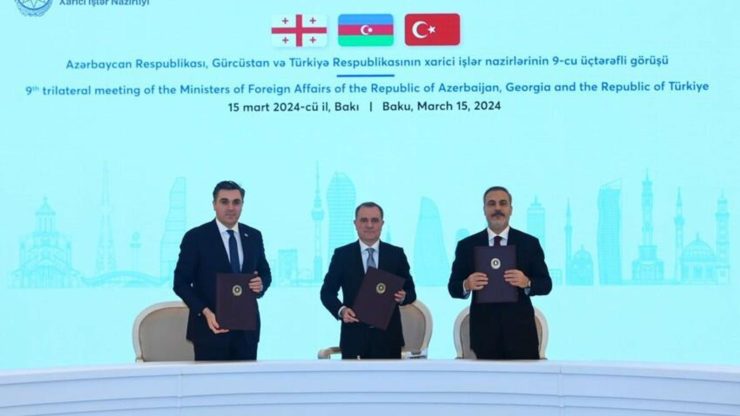
On March 15, 2024, the foreign ministers of Turkey, Georgia and Azerbaijan met in Baku. The main outcome of the trilateral negotiations was the signing of the so-called “Baku Declaration,” in which the parties defined the main directions of cooperation development.
The meeting was held on the sidelines of the XI Global Baku Forum “Restoring the Fractured World,” which was attended by delegations from more than 70 countries.
The Declaration paid special attention to the comprehensive promotion of the trilateral “Middle Corridor” – a continental multimodal transit route designed to connect Eurasia’s largest economies, the EU and the PRC, via the Central Asian states, and Transcaucasia and across the Caspian Sea. The parties agreed to accelerate the pace of implementation of this initiative.
For a fuller understanding of the significance of the Baku Declaration, it may help to look at the role played by Central Asia in the signing of this agreement and also to examine the transport and infrastructure partnership between Turkey, Georgia and Azerbaijan. In this regard, it is worth noting the success of the visit to Baku by the President of Kazakhstan, Kassym-Jomart Tokayev, which ended two days before the signing of the above-mentioned Declaration. During that visit the leaders of the two countries signed a number of significant agreements on transport cooperation, including an agreement on the mutual recognition of professional qualifications of crew members on marine vessels, a strategic partnership agreement between the Azerbaijani Investment Holding and Kazakhstan’s Samruk-Kazyna JSC and an agreement on the phased increase in the volume of Kazakh oil carried through the territory of the Republic of Azerbaijan.
This meeting was preceded by the opening in early March 2024 of a Kazakhstani transport terminal in Chinese Xi’an, and, in late 2023, by negotiations between Kazakhstan and the PRC in which the two countries reached a framework agreement on the development of cross-border transportation routes. Another notable event was the Global Gateway forum, which was held in Brussels at the very end of 2023, during which the EU expressed interest in developing Kazakhstan’s transit potential.
Naturally, the development of transport and infrastructure projects in Central Asia (especially East-West highways) has a direct impact on the promotion of similar initiatives by Azerbaijan, Turkey and Georgia. However, this tendency works in the opposite direction as well. The development of Baku’s contacts with Astana is therefore key to the success of the initiatives referred to in the Baku Declaration.
However, it would not appear to be in Turkey’s interest to combine the trilateral project with a specific initiative in Central Asia, as both Kazakhstan and Uzbekistan are actively promoting joint projects with the PRC, which are similar in function and, at least in part, alternatives to each other. Consequently, if one of these countries is invited to join Turkey, Azerbaijan and Georgia in their Middle Corridor project, the other (especially if Kazakhstan is chosen as a partner) will be forced to participate in a competing project, specifically the creation of the Southern Corridor. Progress on this competing project is advancing at a slower pace, as its potential participants (Iran and Turkmenistan) are much less actively involved in transit negotiations than Kazakhstan, Uzbekistan and Azerbaijan. However, the Southern Corridor remains a potential alternative. Moreover, at the “other end” of Uzbekistan’s projects, there have also been notable successes. For example, the PRC, Uzbekistan and Kyrgyzstan are currently discussing the details of the a trilateral transit highway project.
That is why at present the Central Asian countries are not parties to the trilateral negotiations, but are participating indirectly through bilateral consultations, with Baku increasingly acting as an intermediary. This is despite the fact that Kazakhstan is in a much better position than Uzbekistan when it comes to developing partnership relations with Azerbaijan.
As a result, we have a situation in which the trilateral initiative (the Middle Corridor project) is legally separate from the Central Asian projects, but in reality is closely connected to them. Therefore in order to understand the political and economic processes in Transcaucasia, it is increasingly becoming necessary to pay attention to the similar processes underway in Central Asia.
Boris Kushkhov, Department of Korea and Mongolia, IW RAS, exclusively for the online magazine “New Eastern Outlook”